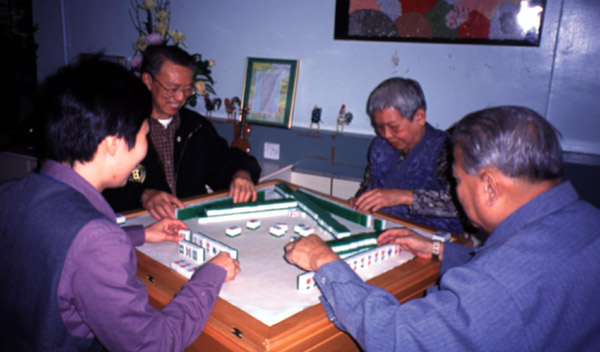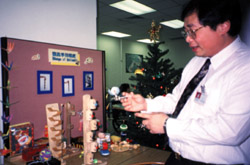 Online
Edition
Online
Edition | From
the editor Letters to the editor Milestone Answerman Campus Life Periscope Social Issues People Photo Features Education Channel Culture & Leisure Science |
| Last
Issue Archive |
| About
Varsity Advertise Media Links CUHK homepage JLM homepage |
Related Links
Hong Kong Occupational
Therapy Association
![]()
Mahjong
New
way to cure disease
By Flora Chan
“Mahjong
can cure hundreds of diseases” is a Chinese idiom that is often used by
mahjong lovers. In fact, playing mahjong is seriously taken as a kind of
treatment.
In
1993, mahjong therapy was introduced as a therapeutic treatment for
patients at the Psychogeriatric Department in Kwai Chung Hospital.
Dr.
Edwin Yu is a consultant psychogeriatrician in the Psychogeriatic
Department.
In
the Psychogeriatic Department, there are mahjong tables in every ward for
patients to play as a leisure activity. But the setup was not originally
tailored for demented patients.
Surprisingly,
Dr. Yu found that more and more demented patients became better and
stabler after playing mahjong.
“From
then on, mahjong has been used as a therapeutic tool for treating
dementia,” Dr. Yu said.
Mr.
Simon Wong, an executive committee member of the Hong Kong Occupational
Therapy Association, said playing mahjong trains body movements.
Before
coming to the mahjong treatment, occupational therapists have to analyse
patients’ conditions and decide which treatment to apply.
During
the treatment, the role of therapists is to teach patients correct posture
and movements.
Other
than the postures, they do not teach them rules of mahjong.
Said
Mr. Wong: “At the beginning, patients may not know how to move to get
the tile from the other side of the table.
“Therefore,
we teach them to move their bodies forward to get the tile.
“Later,
they may try to straighten their arms to achieve the goal.”
Actually,
playing mahjong makes treatment of illness easier in other areas.
If
patients have problems in gross motor activity, such as in the shoulders
or elbows, playing mahjong can train a range of muscles.
For
example, it can train patients to pinch their fingers by piling up tiles,
starting from three pieces, to six, 10 and so on.
This
treatment can also help patients who cannot balance themselves properly.
Said
Mr. Wong: “For patients with hand injuries, their sensations are poor.
And every touch of a mahjong tile is a stimulation, which helps to
re-train the sensations of patients.
Since
mahjong tiles have different textures and designs, touching them gives different degrees of stimulation to the brain.
Sometimes,
Mr. Wong call this “sensory re-education”.
Besides,
it can train the mind.
Mr.
Wong said that alertness and concentration are prerequisites for patients
to play mahjong since patients have to pay attention to what others are
doing.
Dr.
Yu said that playing mahjong requires patients to think. Once they think,
it promotes blood circulation in the brain. This maintains and accelerates
the metabolic rate of the brain.
It
also enhances the brain cells to perform their functions and maintain a
good neural network in the brain.
Dr.
Yu said that about one-third of patients had better memory. Their
intellectual deterioration was slowed by playing mahjong.
Ms.
Cammie Lee (not her real name) is a 71-year-old demented patient who is
receiving mahjong treatment at the Psychogeriatric Ambulatory Care Centre
of Kwai Chung Hospital.
“At
the beginning, when I came here, I had poor memory,” Ms. Lee said.
Ms.
Lee had not played mahjong for 30 years, but after playing it as
treatment, her memory has improved.
In
the Mini-mental State Examination, the score of her was increased from 23
to 28 within 10 months.
The
Mini-Mental State Examination is a simple test which acts as a preliminary
indicator of the condition of patients. The maximum score is 30.
“My
daughter had to bring me home from the hospital in the past, but now I can
return home by myself,” she said.
Playing
mahjong not only improved her memory, but also gave her a chance to make
friends.
“Patients
receive support from each other when playing mahjong. I am more active and
happy now,” she said.
Mr.
Wong said that through sharing of
feelings or experiences, patients felt under less pressure during
the game.
Mr.
Albert Chan (not his real name) is another patient receiving the
treatment.
Said
Mr. Chan: “I wanted to die when I knew that I had dementia.
“After
receiving the treatment, I have become happier and have never thought
about death or any unhappiness any more.
“Playing
mahjong also trained my brain and hand to be more agile.”
Mahjong
not only makes him happy, but also gives him confidence.
Both
Dr. Yu and Mr. Wong emphasised that playing mahjong is only one of the
activities in the treatment of patients.
“Playing
mahjong is only a small part of patients’ daily activities in the centre.
“There
are many different kinds of activities that also help patients to recover,”
Dr. Yu said.![]()
Dementia
Dementia is
a kind of brain activity deterioration.
I
Older people
tend to have dementia.
Acetylcholine
is responsible for impulse and information transmission from nerve to
nerve.
The lack
of acetycholine thus results in poor memory.
![]()
|
Flora Chan
 Playing mahjong helps patients recover from physical, mental and psychological problems. |
Flora Chan

Besides
playing mahjong, other activities can also help patients recover.